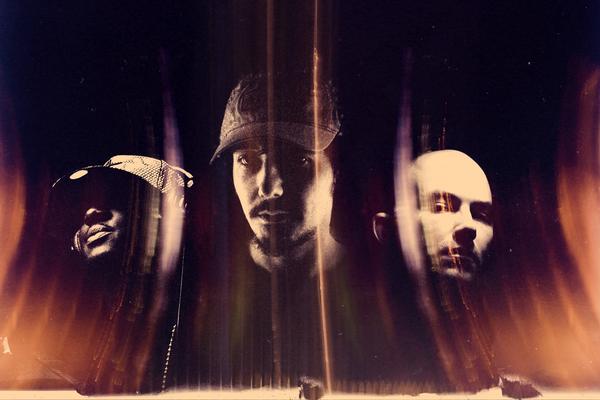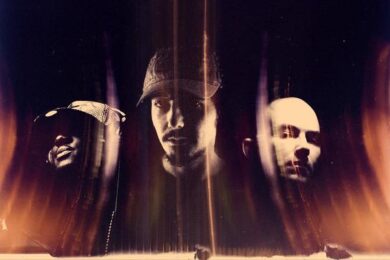Two Fingers music is delicate music. Fast, gentle and hard, like a muscleman dancer whose feet barely seem to touch the ground. A duo comprised of the internationally famous experimental sound technician Brazillian Amon Tobin, and the slightly less well known (til now) Brightonian outer limits drum & bass producer Joe ‘Doubleclick’ Chapman, they met at the dawn of the decade in Brighton and kept in touch after Tobin moved to Montreal in 2002. Playing together first on Tobin’s 2003 Collaborations EP, they saw the fruits were good and endeavoured to take things further.
Starting in 2006 did just that, adopting the Two Fingers name and recording a stash of material for use both on their self titled debut and a series of remixes (Spank Rock, Kelis, Missy) seeping over the internet right about now.
Don’t be misled by the bare facts, though. Read the wrong way a list of personnel can be misleading. Sure, there’s a clear link through Two Fingers to Tobin’s past work, but it’s mostly in the details, a theoretically infinite palette of sound with a fondness specifically for neat jungle frequencies and noises that elude easy definition. Shenhai? Bansuri? A Yamaha 1200 bike starting up? Wooden balls rolling around in a glass cup? None definitely here,.all perhaps present. The crucial difference is this time round you won’t have any trouble dancing to it.
This time out both men are done defying genre and are set on embracing it. Specifically, Two Fingers is wholeheartedly hip-hop, both in attitude and its menu of concise, structured, modern rap songs. Voices are provided by occasionally by former Timbaland and Missy Elliot protoge Ms Jade, dancehall MC Ce’Cile and, more often, this years most misunderstood UK rapper, Sway. Relax, he’s on the best form he’s been in a while. It’s a great album.
This is a hip-hop album, right?
Joe: “Yeah, definitely.”
Do you feel comfortable taking on that tag given all the cultural bagage that comes with it, or were you a little bit wary?
Joe: “We do because of what hip-hop means personally to us. We understand a lot of people would be puzzled to hear us describing what we do as hip-hop. But in terms of approach it’s absolutely a hip-hop record. We’ve built up our sounds by doing an enormous amount of crate digging which has led us to all kinds of music from all over the world. And we’re both getting on a bit in years, we’ve seen many different changes happen in hip-hop. I remember the hostility when Missy Elliot and Timbaland came along and shifted out of r+b. People didn’t accept it purely because of the technological aspects of the sound, which to us is counter-intuitive. This is a music about technology.”
But people get attached to the technology behind whatever hip-hop they first fell for.
Joe: “There are so many different camps, all of whom think the other is wrong.”
Is it like that in drum+bass as well?
Joe: “It can be, yeah. Although to be fair to people into drum+bass it’s maybe not so much a hostile reaction.”
Did you set out to make a bunch of concise songs?
Joe: “We wanted to keep them short. The kind of music that me and Amon were making before is quite indulgent by comparison. It’s up to you how long it is, you can fill it with sound. This was about making something more stripped down and always keeping in our minds the ghost of a vocal that isn’t in there yet.”
Are you aiming at the US mainstream or is it more a niche thing?
Joe: “Well, it may seem stupid but that’s definitely where our ambition lies. We’d love to break through to the American market. If we can make that work we will. We’ve seen all kinds of encouraging little signs over the years. Especially while we’ve been making this record, like there was a one-off Neptunes thing that was on a mixtape a few years back. We heard it and we were just like, ‘Woah. They’re using these distorted bass-lines and the same kinds of drum sounds that we use.’ You get these encouraging signs that maybe something’s moving in that direction. We’re going to try to work with as many people as we can, we’re especially interested in American MCs and singers. If we can make that change ourselves we’ll be very happy men.”
Did you and Amon have any say in the lyrical concepts?
Joe: “No say, really. The really interesting one was working with Sway. When we were preparing for him to come out we were asking him, ‘Have you got ideas in mind?’ and he was saying, ‘No. I’ll just get on the mic and I’ll do it’. And obviously we were a bit scared about this, thinking, ‘Please, please come up with things before you come’. But we needn’t have worried. He’s just an incredible talent. There were just a couple of tracks where he was setting the bones of story going and then he’d stop and say ‘have you got any ideas for where this maybe goes next?’ Which he would often ignore, but there you go. There have been a lot of false storms with certain UK MCs supposed to break through in America, but I really believe that Sway will have his time. He absolutely deserves his place.”
Sway: “I’d say 95% of it was inspired by the music while I’m out there. What I do is I’ll just be walking down the street, or driving down the road, and something will come to me, and I’ll just note it in my blackberry. And when it comes for me to record a song I look at my notes and see what’s going to prompt the verse. Sometimes one line’s going to prompt a whole verse.”
How much impact did it have recording out in Montreal?
Joe: “I’m sure all of that ice and minus 30 degrees temperatures had to play a part somewhere. It could be the place, it could also be a kind of self enforced isolation that influences that sound. We pretty much locked ourselves in Amon’s studio for two years. It was intense. And you’re a little more cut off than you would be other places if your French isn’t great. So we were kind of relying on each other socially as well.”
Sway: “It wasn’t so much the environment cos I’ve recorded all over the world, but one thing I liked about it was they allowed me to just be a rapper. On my own solo material I’m so into what I’m doing musically, video wise, everything. Even when I don’t produce the actual track I go so into it and I change so much that it becomes my song entirely. They kind of allowed me to just go in the booth and express myself purely as a rapper. They gave me a bit of a break.”
Coming in to this I thought it would have been more of a challenge for you. It’s out of the lane that you’re normally in. But from what you’re saying it sounds like it was easier.
Sway: “There was so much less pressure. I think a lot of the old Sway fans, from my battle rapping days are going to be into this album. More than my current fanbase. Because it’s just no holds barred. When you’re making my style of album there’s so much competition out there to make a radio record, and to try and chart. Sometimes influences me subliminally. I have to cut down the verse to sixteen bars and make sure it’s less than three minutes. But when you’re working on an album where you can do whatever you want, if you have a twenty four bar verse it’s cool. If the song goes on for six minutes it’s cool. I was kind of like just back to Derek Safo again.”
Be honest. What was the first thing that came to mind when you heard the words ‘Two Fingers’ as the name of the band?
Joe: “The first thought was can we come up with a name that’s identifiably British. In America it’s a completely different thing. But I don’t want to take that name if people are only going to think of the v-sign thing. It wasn’t to have a semi-aggressive name, it was because when I thought about it, there are actually very few people on this planet who’ll even think of it that way. Once you think of all the different ways that it can be perceived.”
Sway: “It’s very rebellious, isn’t it? The great thing about it is one way the position means ‘fuck off’, the other way it means ‘peace, everybody let’s sit down…’ Or a lot of other sexual kind of references. It can mean so many different things, I think it’s genius.”
Personally I hear that agression. I guess ‘two fingers to convention’ would be my take.
Joe: “That’s gone into it. But one of the things that we’re not so fond of is when you cross the line from menace to into actual aggressive sound cos it come across geeky in a way. We like stuff that sounds tough without necessarily crossing that line. And there are lighter tracks on the album, too. But two fingers to convention? That’s true as well. We were out to make a sound that can be popular with a lot of people.”
Catch Two Fingers and a Sway solo set at Scala on May 13. Nice up yourself!



